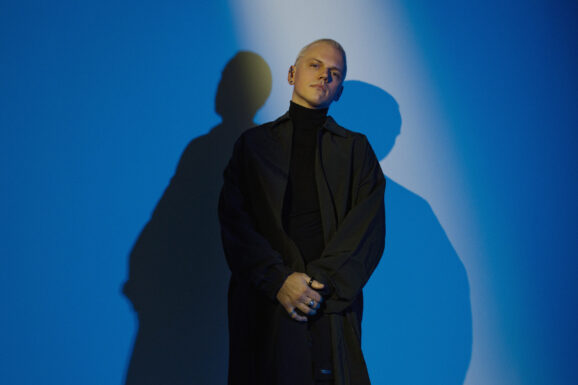The Jayhawks held a live stream event performance on November 29th from Slamhammer in Minneapolis, Minnesota, featuring a full play-through of the band’s 1997 album Sound of Lies. The performance was the second in a three-show series, with an October show featuring their 2020 album XOXO, and one more show coming up on January 10th, 2021 that will focus on cover songs, all hosted by Mandolin.
Sound of Lies was the first album featuring the current Jayhawks lineup of Gary Louris, Marc Perlman, Karen Grotberg and Tim O’Reagan, who all took part in the livestream, and they were also joined by guitarist Kraig Johnson and violinist Marv Gohman. Rather than just playing the 1997 album Sound of Lies, however, the band also included the “bonus tracks” in their performance that you’ll find on the 2014 reissue of the album which was released on CD and double LP. A surprising final song, “Until You Came Along” was also added to round off the evening’s show.
According to Gary Louris, one of the reasons the band chose Sound of Lies as the focus of the livestream was because of the special role the album plays in their shared musical history as the first album they wrote after the departure of Mark Olson, a time when they weren’t entirely sure that they would endure as a band. It was also a time to explore musical directions. It makes sense in terms of Jayhawks history to take that tack because their recent release, XOXO is the most expansive and egalitarian approach to songwriting they’ve ever taken, with all of the current lineup contributing new songs and kicking off what the band feels is a “new direction” based on the same identity.
During the concert, the band often paused between songs to reminisce about the time period in which the album was written and what their early relationships were like as band members.
With multi-camera filming, gig lighting, and a set up that enabled bad members to face each other in a loose circle rather than an audience, there was plenty of room for banter and adjusting of instruments, giving viewers a combination of a live concert and a backstage access feel.
Starting off with “The Man Who Loved Life”, a rather open, contemplative, and vibey song was a good reminder of why that song was chosen to open the original album as a mood-setter for both the Country-Rock and Psychedelic Rock elements the album would explore, questioning, “Am I living in your dream?”. The second track, “Think About It” brought in more electric sounds, but the Folk and Country elements came in more heavily in the lyrics and vocal style, suggesting just how much the band was exploring combining genres at the time of the album.
By the time the band hit the third track, “Trouble”, it was easy to see how early Rock ‘n Roll was still a source of inspiration for them in 1997, with the song taking an almost Beatles-like approach in vocal layers which actually came in so strongly that it built up some energy and drive. Some of the themes in the song continue to feel very relevant, like the idea of “the blind leading the blind” and the desperation of lyrics like, “Left hung out to dry, my back’s against the wall.” There was also a very impressive guitar solo that continued to be very emotive, unhurried, and driving.
Taking a pause from playing, Gary Louris commented that he remembered writing “Trouble” with Marc Perlman. Perlman remembers it as song that Louris had given up on at a time when Perlman didn’t yet know how to write songs. At one point, Perlman was playing the tune in the kitchen and Louris went and got a recorder to capture it. The two veered into a discussion about rooming together and working in the service industry. Louris recalled that he “had the nametag Elvis and spilled a lot of drinks” at a restaurant because he lied and said he knew how to serve drinks in order to get the job.
Their fourth song, “It’s Up To You” kicked up the energy of the performance with a strong melody and Americana vibes (though in 1997 the sounds were hailed as Country-Rock). The song takes on something now familiar in Jayhawks songwriting, the chronicle of emotional states and private thoughts in narrative format. The lyrics also veer more traditional Country phrasing and modern settings and feelings more typical of Alt-Rock.
During another chat, Kraig Johnson remembered Sound of Lies as the first record that he played with the band and he had a gallery that lasted a few months with “overpriced” items. Gary Louris explained that they had a gallery in Minneapolis in the same building where the band did their first “major label” recording outside of LA. Mark Olson had left the band and the other Jayhawks thought that this might be their last album, so they also felt like they could do whatever they wanted. The opening of “Gallery Merlot” catered to the idea that after you did a cut in the studio, you could walk through the gallery and look at overpriced art by Johnson and Louris.
For their fifth track, “Stick in the Mud” the band and audience got to sample “mood lighting” with a stark, almost black and white feel, and we got a taste of how much violin can moderate Jayhawks sounds, though the lyrics harkened back to the Rockabilly and Blues with phrasing like, “Got no cross to bear” and “Begging you, please don’t leave.” It was a good setup for their “Big Star” to follow, which was the album offering that surprised fans most in 1997 with its full-on Rock approach. It anticipated even bigger leaps into other genres coming up with the Pop driven album Smile to follow. Though the piano of “Big Star” really grounds the song, and its lyrics swerve toward Country, it’s the subversive moments of wah wah and electric fade that feel almost Grunge. It just reminds you how many doors were open to the band at the time if they had chosen to go further.
In another impromptu chat, the band revealed that Karen Grotberg had been working in the same building where the band were recording at the time of Gallery Merlot, though Grotberg actually lived in Wisconsin at the time and therefore got “no sleep”. They used to walk by her window and tell her it was time to leave that tedious job and join them instead. After work, it was time for Grotberg to hang out at Café Merlot, where she actually met her husband. They are still married, though it took them a while to get married, she added. They all agreed that 1996 was a “good year”, working at “Pants Optional Studios”.
Their seventh song, “Poor Little Fish” was introduced as a tune that “started with a bong”, a comment which led almost every band member to do their own bong impression into the microphone for the audience at home. You don’t need much confirmation of this anecdote than lyrics like “Where you are is who you are when you’re sleeping…” If we were forgetting the Country-Rock background of Jayhawks, it was brought firmly back around with a song that Louris commented gets a lot of requests, “Sixteen Down”. This haunting ballad’s mysterious narrative may have its classic Rock moments, but the whole subject matter of (possible) youthful death felt like a Western or Country dolorous tale. Still, there’s that Grunge possibility creeping in again with this song, even if it’s just a hint.
Ninth song, “Haywire”, brought us more directly into 90s sounds, but also more of a full band sound, layering instruments and vocals and putting the “Alt” in Alt-Rock with its tortured love imagery, taking in settings ranging from Pittsburg to the Bayou, existing as a “blade bending in your shade”. “Dying on the Vine” took us deeper into shadow, both with darker, heavier sounds and with darker themes. A guitar solo that sounded almost Hendrix-y injected some Psych and lyrics like “scared of you” took us on an uncanny trip. Even Louris commented, when asked about the song during the performance, that “that song conjures up a lot of weird memories” for him, many “too painful” to talk about. The experiences that led to writing the song were “not that good” but it definitely resulted in a “good song”.
The eleventh song featured a really vibey intro to “Bottomless Cup” as written by Tim O’Reagan. A reflection on loss, separation, and the role of someone in a complex relationship, the song has an admirable resistance to simple explanations. The person who the singer addresses seems to make them set their own standards higher in life, but judging their impact involves some pros and cons. O’Reagan joked that writing that song was “too private” to talk about, like Louris’ earlier statement. Louris retorted, “From one master songwriter to another, I get you.”
For the twelfth song, and title track, “Sound of Lies”, we moved into more acoustic territory, and hearing the song in this 2020 context did call for some reappraisal. It’s still surreal in its lyrics, even referencing dreams, and the flute-like synths carried that feeling further. It’s hard not to take a harder look at a phrase like,“The sound of lies rings funny against the truth” in our age of confused information and divisiveness. When the song returns to, “Matter of time before I fall”, it “rings” ominously and can only hope that we can continue to tell the sound of lies from the sound of truth.
The Jayhawks then moved on to their “Bonus Tracks”, including “I Hear You Cry”, sung by Marc Perlman, with more soulful sounds and slower beats that might have kept it off the album proper but still clearly fits within the band’s wide range of genres. Their fourteenth song, “Sleepyhead” was hailed as a “deep cut” and is very Psychedelic both in sound and in lyrics, returning to the phrase, “wake up little sleepyhead and dream”, and embracing progressions as it went rather than more cyclical song structures. “Kirby’s Tune” finished off the Bonus Tracks offerings as quite a rocker with heavier drums and multiple guitars.
After the band thanked both the audience, joking “Thank you for enjoying us,” as well as the folks behind the scenes, they brought in the surprise song “Until You Came Along” to close things out. Louris explained that the song, which he described as “famous worldwide” and a “dance sensation”, was originally written for the album Sound of Lies but ended up worked for the supergroup Golden Smog instead, so he felt it was appropriate to play the song with Sound of Lies. With an even more layered guitar sound, a bar-room setting, and vocals that sound a little Country, you can see why it might have skewed Sound of Lies more in a Country direction had it been included with the other songs, but all the same it seemed cut from the same cloth and playing it with the album did seem like a welcome return to the fold. Not to mention it was another song for our current times, with “Sometimes you’re up, sometimes you’re down”, and a little bit of hope and energy injected into the situation when “Darker got darker, Until you came along.”









